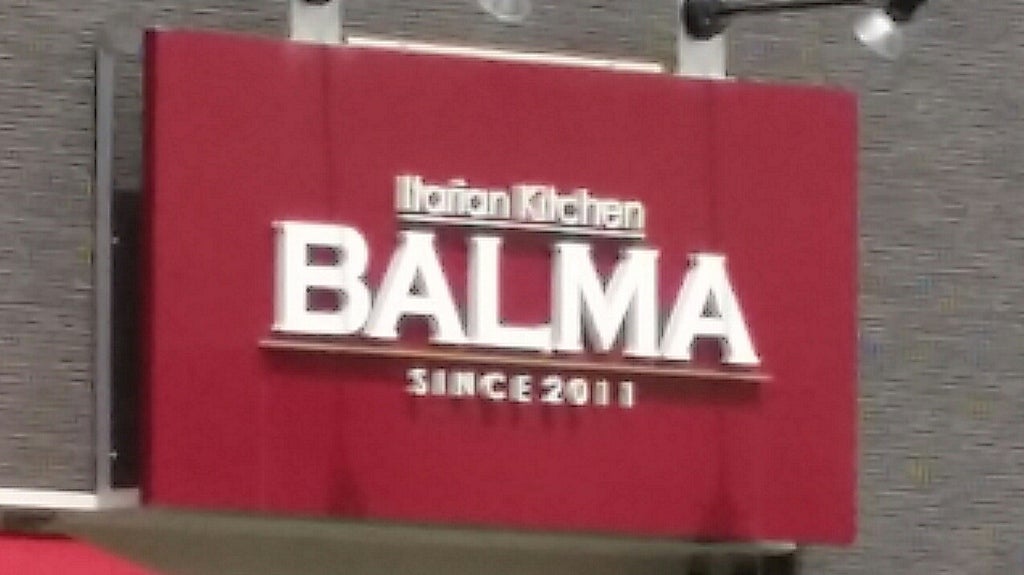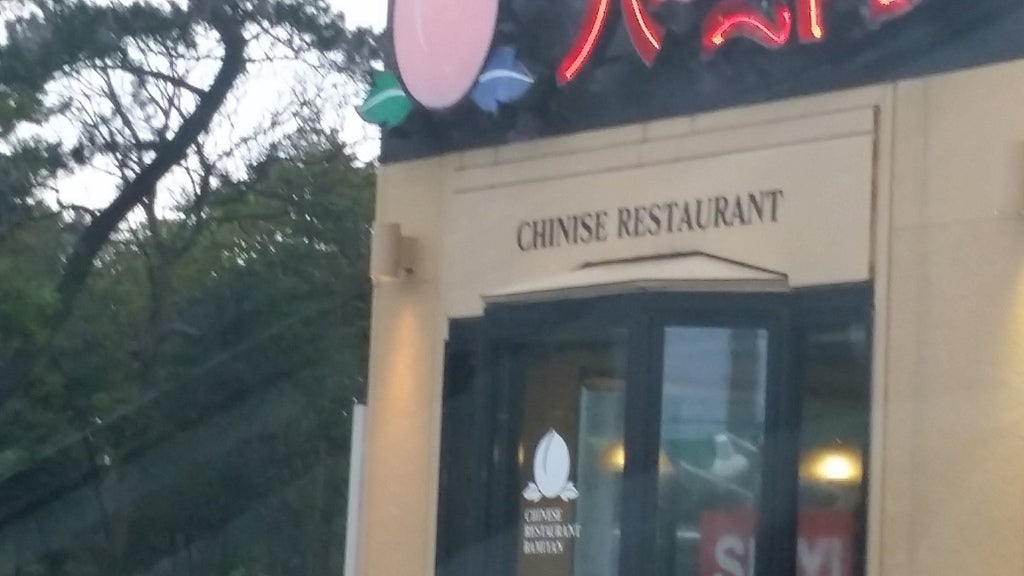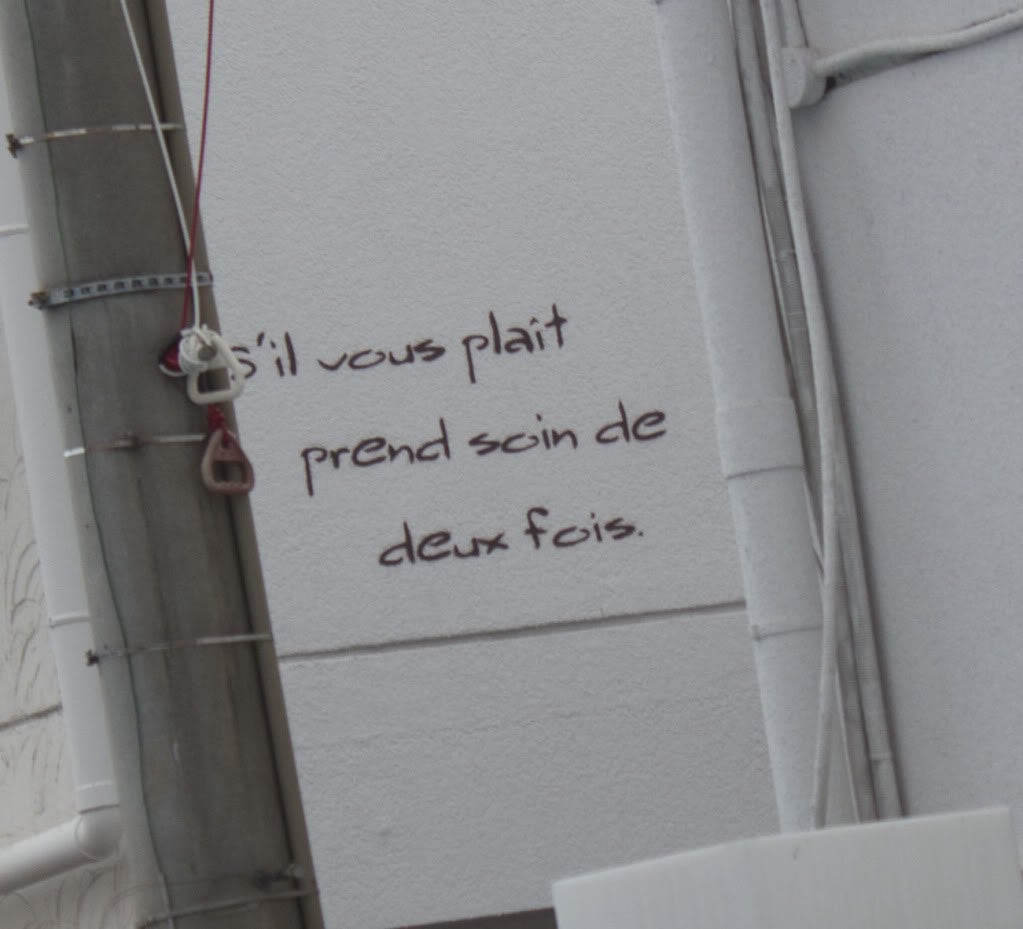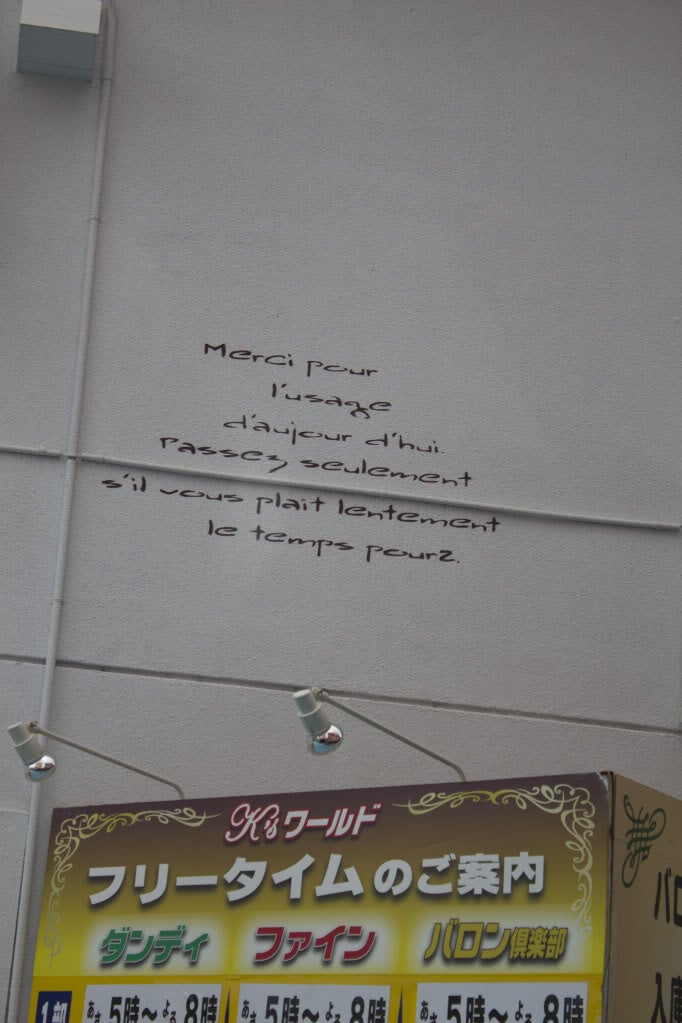 "Flavien Vidal" (flyingfrenchy)
"Flavien Vidal" (flyingfrenchy)
04/26/2015 at 03:45 • Filed to: None
 2
2
 13
13
 "Flavien Vidal" (flyingfrenchy)
"Flavien Vidal" (flyingfrenchy)
04/26/2015 at 03:45 • Filed to: None |  2 2
|  13 13 |
Somehow, japanese love using english words here and there... I guess it sounds cool to them. On the other hand, I think it’s fair to say with a statistic I’m pulling out of my ass, that 99% of japanese can’t really speak a word of english or a word of any language other than japanese for that matter...
The end results are restaurants with... weird spelling :)
(Really zoomed cell phone pic sorry for the pixelling, this an “Itarian Kitchen”. Japanese mix “r” and “l” constantly. This is of course “Italian Kitchen”. The guy can’t spell the country of origin of his own themed restaurant... I let you imagine the food itself!)


Or french...

Taken at a “Love Hotel” a while ago :)
This means absolutly nothing... Translated litteraly in english it would give something like ”Please, take care of twice”

Or this one, same place... “Thanks for the use of today, spend only please slowly the time for 2”
Anyway, if you ever get the opportunity to spend time here, they have tons of tshirts with writings that means nothing and with a crap load of spelling mistakes. Get one. It’s so worth it :)
 armandthegreat
> Flavien Vidal
armandthegreat
> Flavien Vidal
04/26/2015 at 03:55 |
|
This is what happens when you lose a World War. If we lost, we’d be speaking German and Japanese pidgin too
 Flavien Vidal
> armandthegreat
Flavien Vidal
> armandthegreat
04/26/2015 at 04:12 |
|
lol what? You do know that Japan has been like this for centuries right? It’s only quite recent that immigration is actually “allowed” in Japan, and even then, it’s reserved to people who married a japanese citizen, have a good diploma AND professionnal capacities that are required in the country or come here to teach english, under the condition that they have a bachelor degree of some kind.
This has litteraly NOTHING to do with WW2. It’s just something called “insularism”, a general behavior helped by geographical specificities that prevent from really knowing what’s going on outside of their country and speak languages other than their own.
 shop-teacher
> Flavien Vidal
shop-teacher
> Flavien Vidal
04/26/2015 at 04:39 |
|
They say 72% of statistics are made up on the spot. 83% of people believe them, whether they’re accurate statistics or not.
 Cé hé sin
> Flavien Vidal
Cé hé sin
> Flavien Vidal
04/26/2015 at 04:57 |
|
“It’s just something called “insularism”, a general behavior helped by geographical specificities that prevent from really knowing what’s going on outside of their country and speak languages other than their own.”
Completely unlike, say, America...
 Flavien Vidal
> Cé hé sin
Flavien Vidal
> Cé hé sin
04/26/2015 at 06:06 |
|
No of course, completely different! :)
 Krieger (@FSKrieger22)
> Flavien Vidal
Krieger (@FSKrieger22)
> Flavien Vidal
04/26/2015 at 07:01 |
|
Gratuitous (ab)use of English and other languages by the Japanese has been around for quite a while. It’s quite amusing, although I’m not sure what the average Japanese passerby would make of foreigners doubling over in laughter on the pavement. In any case, Superdry is starting to return the favor, but they’re comparatively new.
The L/R confusion is due to the fact that the Japanese language does not have distinct sounds for both of them, resulting in both interesting translations and interesting speech patterns.
 KusabiSensei - Captain of the Toronto Maple Leafs
> Cé hé sin
KusabiSensei - Captain of the Toronto Maple Leafs
> Cé hé sin
04/26/2015 at 07:15 |
|
The percentage of Americans who actually have a passport is so low that it should be a source of national embarrassment.
I not only have a passport, but in one of my expired ones, I have a visa as well.
One could also reference the fact that Americans do not tend to be multilingual. There is a valid point of using the de facto language of business, but one should also try as hard as possible to know the language for where you travel.
Hence why I know:
English, French, some German, some Dutch, some Japanese, a little Italian.
 LongbowMkII
> Flavien Vidal
LongbowMkII
> Flavien Vidal
04/26/2015 at 07:41 |
|
Foreign loanwords are often used for newer words, such as airu-kon (air conditioning). Nice apartments/condos are referred to as maisons. The list is nearly endless.
They are also used to imply that it was imported and therefore, expensive and high quality.
 LongbowMkII
> Flavien Vidal
LongbowMkII
> Flavien Vidal
04/26/2015 at 07:43 |
|
The love hotel graffiti makes sense in context. Do it twice! (pay us more for a longer stay)
 Slave2anMG
> KusabiSensei - Captain of the Toronto Maple Leafs
Slave2anMG
> KusabiSensei - Captain of the Toronto Maple Leafs
04/26/2015 at 09:23 |
|
You’re dead right. The provincialism of Americans is appalling.
English, used to be pretty good in German, enough French to understand and be dangerous.
Traveled overseas in the mid 1990s a LOT. Nearly every country in western Europe. Half a dozen times to Japan. Half a dozen to India. Indonesia. Taiwan. Chile. Argentina. Alabama (oh wait...). Between the sheer number of passport stamps and the full page visas issued by India, Indonesia, Turkey, Korea, and Taiwan I had to have pages added to my passport after three years.
It was exhausting which is why I stopped. But 20 years on I tell any younger person that if somebody or a company will pay your way overseas, go. Just go.
!!! UNKNOWN CONTENT TYPE !!!
 Tohru
> Flavien Vidal
Tohru
> Flavien Vidal
04/26/2015 at 11:32 |
|
I was under the impression that every Japanese school student took 3 years of English. Then again, I took two years of Spanish and all I remember is “How are you”, “where’s the toilets”, and “beer please”
 tapzz
> Flavien Vidal
tapzz
> Flavien Vidal
04/26/2015 at 12:11 |
|
After a little while in Japan I realised that those signs and slogans aren’t English or French; they’re Japanese. In discourse terms, both the speakers and listeners (i.e. the sign writers and readers) are native speakers of Japanese with a tenuous or non-existent grasp of English or French. So for the intended audience, these speech acts are readily intelligible and unambiguous: this establishment is hip, classy, and a bit exotic- especially the French one. Any identifiable and useful words in these signs get readily absorbed by phonetic adaptation and rendering them in katakana, using a process every speaker is familiar with.
That the signs look weird or full of errors to native speakers of other languages is irrelevant: who cares what they think, it’s not for them. If you need to communicate with gaijin, you use actual English, and worry about spelling and word choice etc.
 Flavien Vidal
> Tohru
Flavien Vidal
> Tohru
04/26/2015 at 18:44 |
|
Exactly the same in Japan. Really, I know it’s a stat that comes straight from my ass, but I’m pretty damn sure that over 99% can’t speak a word of english.